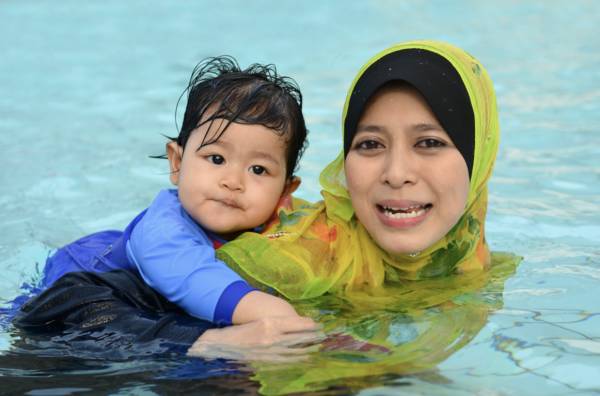Swimming is a great way to beat the heat, get in some exceptional exercise, and have a great time doing it! There are wonderful benefits to swimming but many parents don't know when to get their children started. Here are some studies and tips to help you feel prepared to make that decision.

The American Academy of Pediatrics for years suggested that children should start learning to swim at the age of four. This allows time for children to be well adjusted to the water and gain confidence. However with the outcome of recent studies, the academy has shifted their thinking. They now believe that children as young as one should start formal swim training. With that being said, there are ways of testing whether or not your child is ready for lessons.
Being well acquainted with being in water is key in learning how to swim. To prepare your child, try these tests in a pool you're comfortable in. First, practice getting their face wet without them swallowing water. If they can master that, the next step is blowing bubbles in the water. Lastly, have them try to kick their legs while you are holding them. These steps will help them feel more at ease in the water, ensuring a more effective transition into formal lessons.
Getting your children comfortable in the water and into swim lessons significantly helps in preserving your child's safety around water. While pools, lakes, oceans, and other water activities are fun and great ways to cool off with loved ones, there are also risks that come with them. Accidents happen, adults get distracted, and ensuring your child is independently comfortable in the water will give you peace of mind that they are ready and safe in any situation.
Being well acquainted with being in water is key in learning how to swim. To prepare your child, try these tests in a pool you're comfortable in. First, practice getting their face wet without them swallowing water. If they can master that, the next step is blowing bubbles in the water. Lastly, have them try to kick their legs while you are holding them. These steps will help them feel more at ease in the water, ensuring a more effective transition into formal lessons.
Getting your children comfortable in the water and into swim lessons significantly helps in preserving your child's safety around water. While pools, lakes, oceans, and other water activities are fun and great ways to cool off with loved ones, there are also risks that come with them. Accidents happen, adults get distracted, and ensuring your child is independently comfortable in the water will give you peace of mind that they are ready and safe in any situation.



